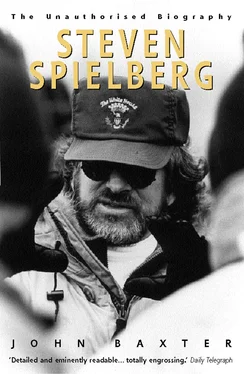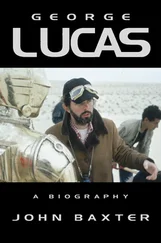1 ...8 9 10 12 13 14 ...31 There are no good years to enter the film industry, but 1963 was worse than many. Hollywood was drastically reorganising. Since just after World War I, it had been dominated by the major studios: MGM, Paramount, Twentieth Century-Fox, Columbia, Universal and United Artists. However, the Federal Justice Department had decided that companies which controlled every step in the production of film, from conception to marketing, were in restraint of free trade, and forced the studios to shed their theatres, and open production to independent film-makers.
Shorn of the power to control production and distribution, the studios re-inserted themselves into the equation in a different role, lending the independents money, renting them office and production space, and organising promotion and distribution. The charges they levied for their help were often extortionate. Spielberg’s fees for Jaws and his percentage of its profits, known in the trade as ‘points’, would give him a personal fortune in the millions, but it was Universal and Columbia who really profited. Of Star Wars ’ $200 million US domestic income, George Lucas would complain that he personally received, after taxes, less than $20 million.
Even by milking the film-makers, however, the studios still could not defeat television. Throughout the fifties and early sixties, desperate for novelties to win back their audience, they exhumed and relaunched all the technical improvements which had been developed over the previous half century but abandoned for lack of investment or interest: 70mm, CinemaScope, 3-D, VistaVision, even Aromarama, smellovision, and the tricks popularised by William Castle; seats wired with electric buzzers and plastic skeletons falling from the ceiling.
None slowed the inexorable trend towards home entertainment at the expense of the cinema experience. Many studios saw this as the writing on the wall, and hurried to cut their losses. The accumulated movies of fifty years were sold off to TV. Everywhere, backlots were bulldozed and the land redeveloped for office buildings. By the end of the sixties, MGM and Twentieth Century-Fox, rather than retain large warehouses of costumes and props and the staff to service them, would sell everything at auction: Garbo’s gowns, Judy Garland’s ruby slippers from The Wizard of Oz , Charles Foster Kane’s Rosebud sled from Citizen Kane – the patrimony of Spielberg’s dreams, fragments of which he would later pay a fortune to retrieve.
Some of the most attractive real estate in greater Los Angeles belonged to Universal Studios. Its 374-acre studio and backlot was the first thing a visitor saw as he topped the Cahuenga Pass out of Los Angeles and slid onto the wide flat floor of the San Fernando Valley, the dormitory suburb of greater LA. Universal’s chairman, Lew Wasserman, was a cunning and stubborn negotiator with a reputation for seeing further than many. As head of the MCA talent agency he’d pioneered package and profit-sharing deals under which stars deferred salary in favour of a share of income. The first such deal he negotiated, for James Stewart, made the actor a multi-millionaire. MCA had bought Universal Studios to guarantee work to its clients and a supply of television product to the networks and advertising agencies with which it enjoyed production deals. In 1962, however, forced by the Justice Department to decide whether it was an agency or a film producer, MCA shed the former and went into film-making full time.
To mark his territory, Wasserman commissioned an office block from the prestigious Chicago firm of Skidmore, Owings and Merrill, an opaque stub of anodised aluminium and black glass. Inside, according to rumour, the dividing walls were movable. An executive in disfavour might arrive one morning to find his office subtly more cramped than when he left the night before.
From his seventeenth-floor executive suite, Wasserman squinted out over his fiefdom, and wondered how to make money with it. From high on the hill, the half-scale Gothic mansion from Hitchcock’s Psycho looked down on the plaster-and-lath sets where Lon Chaney Snr made his version of The Hunchback of Notre Dame , and his son Lon Jr The Wolf Man . The Invisible Man , Frankenstein and Dracula sprang from here, as did their multitudes of sequels. Jack Arnold’s films were shot on these sets and stages too. In the sixties, Ernest Borgnine and the crew were making the TV series McHale’s Navy on the black lagoon from which the creature had crawled. Interiors for Wagon Train and The Virginian were being shot on sets where Boris Karloff had once worked. Most of Universal’s income, however, was generated by a few blocks of bland shopfronts that provided a setting for modern cop shows and spy stories. Meanwhile, run-off from the hills was undermining the older sets, some of which were already collapsing.
One cost-cutting option that didn’t exist was firing people. The film production and craft unions, IATSE, the International Alliance of Theatrical Stage Employees, and NABET, the National Association of Broadcast Employees and Technicians, aided by Jimmy Hoffa’s corrupt Teamsters, enjoyed near-omnipotent power. ‘Feather-bedding’ was rife. Once you were in, you were in for life – and beyond, if, like many, you apprenticed your sons. In the same way, a handful of executives circulating from studio to studio dominated management. ‘Affirmative action for family members,’ acknowledged the Los Angeles Times , ‘is an accepted practice in a town where everyone seems to be related to everyone else… A solid education and good grades are not necessarily relevant or even desirable and are considered much less valuable than the kind of insider’s knowledge acquired at the dinner table night after night.’ As Hollywood had joked when David Selznick married the daughter of MGM’s Louis B. Mayer, ‘the son-in-law also rises.’
In the thirties, under its founder Carl Laemmle, Universal had been notorious for nepotism. His son, known simply as ‘Junior’, ran production, and the payroll groaned with cousins. ‘Uncle Carl Laemmle,’ ran the crack, ‘has a very large faemmle.’ In reaction, the company promulgated an anti-nepotism rule in the forties, with jobs allocated by merit and experience. But this soon hardened into a rigid roster system, with pay hikes and other benefits graded according to length of service. Walking off a film meant you lost seniority, so productions at Universal always went ahead, no matter how inept the director or crew. Despite its large complement of staff technicians, most producers preferred to hire contract crews for anything being made to a deadline.
In 1963, the MCA board was pressing Wasserman for a decision about whether or not to follow a consultant’s advice and sell the backlot for hotels and condos, and lawyer Albert Dorskind was put in charge of assessing offers. Dorskind saved the studio. Shopping downtown one day in Farmers’ Market, the ramshackle complex of fruit and vegetable stalls and quick-lunch counters at Fairfax and Third Street, on the fringe of Hollywood, Dorskind noticed a Gray Line bus disgorging tourists. Remembering that Universal’s restaurant was losing $100,000 a year, he rang Gray Line and suggested they put Universal on their itinerary. Visitors could even lunch in the commissary – Eat With the Stars! And it would only cost Gray Line $1 a head, over and above what people ate. Gray Line jumped at it. The restaurant manager upped his prices by 20 per cent, and the commissary was soon in profit.
Spielberg stepped out of the Gray Line bus onto Universal’s hallowed ground in June 1963 with the awe of a zealot entering Jerusalem. He hid until the bus left, then spent the rest of the afternoon poking around, even walking onto sound stages where TV episodes were being shot. He found his way to the cutting rooms, where editor Tony Martinelli was working on episodes of Wagon Train . Spielberg asked questions. Flattered, and glad of a diversion, Martinelli and the other editors were happy to reply. He told them he’d made some movies, and asked if they would take a look at them. One said, ‘Bring ’em in, kid.’ Dazzled, Spielberg found a phone and called his cousin to pick him up. The next day he was back with Firelight and his 8mm films. Almost every day for the rest of his vacation he dressed in his one suit and, carrying an empty briefcase, drove to Universal. At the gate, the guard, assuming he was just another nephew with a summer job at the studio, waved him through.
Читать дальше












